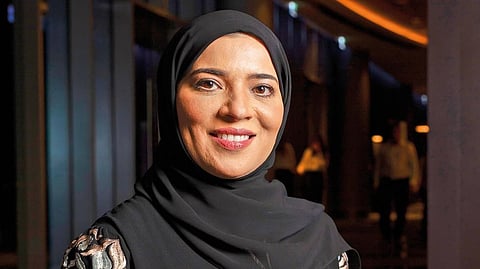Modern game changers: Dr Habiba AlSafar, pioneer in genetics
The Emirati geneticist's groundbreaking work is building the UAE’s capability to go into genetic research

Think trailblazing scientists and Isaac Newton, Albert Einstein and Stephen Hawking spring to mind immediately. How often does Polish-French scientist Marie Curie make that list? The sad truth is, rarely. It’s this narrative the L’Oreal-Unesco For Women in Science programme is trying to change since 1998. ‘The initiative has supported over 3,200 women, rewarded 107 laureates (three have since won Nobel Prizes), granted fellowships in 118 countries till date,’ says Remi Chadapaux, managing director of L’Oreal Middle East. The Middle East Fellowship, now in its sixth year, has been putting female Arab scientists on the global map.
This article is part of series where we speak to three current fellows (announced in November) and three past ones of the Middle East Fellowship.
Also in this series:
- Modern game changers: molecular biologist Wafaa Ramadan
- Modern game changers: Dr Saba Al Heialy, uncovering links between obesity and asthma
- Modern game changers: Dr Maha Al Mozaini, overcoming cultural taboo in HIV research
- Modern game changers: Dr Fatma Al Ma’Mari, experimental physicist
- Modern game changers: Dr Wafa Audah Altalhi, futuristic research on bioengineered organs
Dr Habiba AlSafar, director of Khalifa University’s biotechnology department, UAE, and past recipient of L’Oreal-Unesco For Women in Science Fellowship
The seeds of the honorific ‘Dr’ that precedes Habiba Al Safar’s name were sown when she was a little girl, the geneticist reminisces. Her burning curiosity about how bubbles form, why some liquids react when mixed, and how some people are born with blue eyes and others brown, were never belittled by her parents – parents who couldn’t go to school but were very supportive of educating their children. When her questions outgrew their knowledge, children’s magazine Majid and library books stepped in.
Today, Dr Alsafar is the director of Khalifa University’s biotechnology department. And that’s just one of her achievements. Among her other honours include being awarded the UAE’s first honour medal in 2014 by His Highness Shaikh Mohammad Bin Rashid Al Maktoum, Vice-President and Prime Minister of the UAE and Ruler of Dubai, for being a pioneer in genetics, being a member of the UAE science Council since 2016, winning the 2014 L’Oreal-Unesco For Women in Science Fellowship, and earning the 2016 L’Oreal-Unesco International Rising Talents award.
This year, she took on the mantle of jury member for the fellowship and gave deserving candidates the same break that gave her ‘visibility, networking opportunities and confidence. [The fellowship] put a spotlight on my research identifying a gene that indicated prevalence of Type 2 diabetes in the Emirati population,’ she says.
It’s the fellowship’s peer-review model of assessing applications that allows young female scientists to explore new ideas, make their passions a reality and know their proposals have potential, Dr Alsafar explains. The fellowship, she feels, helps female scientists overcome the main hurdle towards their goals – limited resources. ‘Reading this year’s applications, I see a lot of curious young women and there’s a personal statement or story coming across.’
Dr Alsafar’s own story is a fascinating one of redirected inquisitiveness and dedication. A straight A student who always loved the sciences, she flew to the US to study medicine on a scholarship. It was while pursuing a BSc as foundation for med school that she was first entranced by genetics. ‘I’ve always loved family trees, so I signed up for the genetics elective.’
By the end of the gruelling course two things happened – Dr Alsafar was one of 50 odd students from the original 300 who remained, and her career path switched from medicine to majoring in biochemistry and genetics. After a master’s in medical engineering in the UK, a short stint with Dubai Police’s DNA experts, and a PhD in Australia, she entered academia to ‘build the UAE’s capability to go into genetic research’.
She does this by teaching (she is associate professor at the Department of Genetics and Molecular Biology at Khalifa University) and through the successful summer internship programme for young scientists she started with her fellowship grant to pay it forward. ‘There aren’t many molecular biologists here, so every summer I [mentor] up to 17 students, usually undergraduates, from the Arab world and we work on diseases like Type 2 diabetes, cancer or thyroid.’
A majority of her interns are female, a trend that reflects in her classroom too where she has one male student and 60 females – in keeping with a 2018 Times Higher Education report that states in the UAE more female students enrol for STEM subjects than men. It’s a far cry from the skewed male to female ratio Dr Alsafar witnessed as a student abroad in the 90s, and she credits this to the changing times as well as the UAE’s leadership, which empowers women through policies, opportunities and ensuring female role models are part of science textbooks.
‘My research is about discovering personalised preventive medicine for diseases that can be detected early. There’s less than one per cent of research on the human genome in Arabs,’ she says. ‘I started with Type 2 diabetes, now I’m working on oncology and vascular diseases.’
Sign up for the Daily Briefing
Get the latest news and updates straight to your inbox




